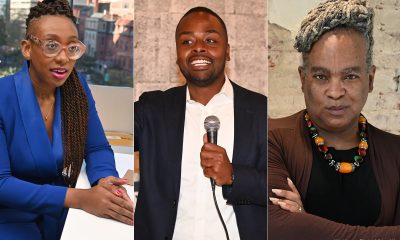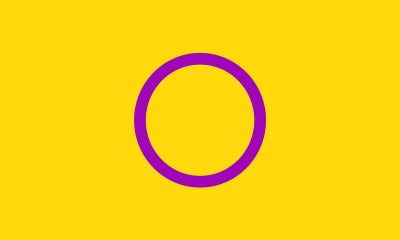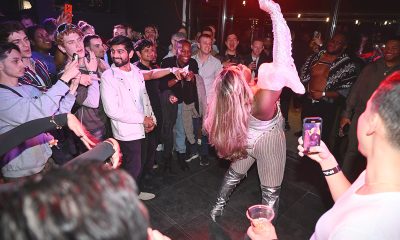Opinions
Memories of marching with King 50 years ago
D.C. was a very different place in segregated 1960s
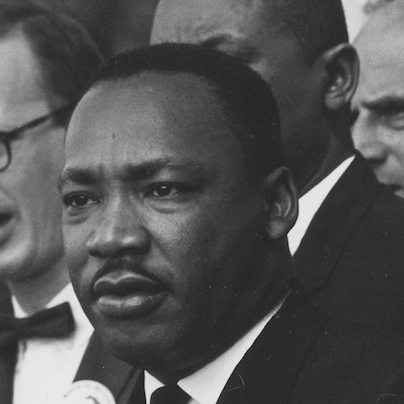
By PAUL KUNTZLER
On Wednesday, Aug. 28, 1963, I participated in Dr. Martin Luther King Jr.’s “March on Washington for Jobs and Freedom.” My partner, Stephen Brent Miller, and I were both 21 and living on Capitol Hill. Stephen had gone to work that morning in the Capitol Building where he was on the staff of House Appropriations Committee.
Because of a fear that there might be riots, President John F. Kennedy declared a state of virtual martial law. My office near Dupont Circle was closed that day.
Washington in 1963 was a different city from what it is today. Racism and segregation were a part of daily life. As difficult as it is now to believe, the staff of the House Appropriations Committee consisted of 22 white males. Further, Stephen was attending the Stenotype Institute of Washington to learn to become a stenotype court reporter. Only whites were permitted to attend the Institute, as was the case with all of Washington’s business schools.
After moving to Washington from Michigan in late December 1961, I landed my first job in the proofing department of Union Trust Company, a downtown bank. I got my job interview through an Arlington employment agency that had an agreement that they would send only white applicants.
During my months at Union Trust, I befriended a young woman who had an African-American boyfriend. All of my colleagues expressed their disapproval that her boyfriend was black.
In early January 1962, I began classes at the American Institute of Banking in the Dupont Circle neighborhood. My instructor for my first class was a middle-aged white male. After introducing himself, he said the Washington Post was a “communist newspaper.” He then went on to make a racial joke.
In 1963, I was on the board of directors of the Mattachine Society of Washington, the District’s first gay-rights group. Frank Kamany was its president. Frank went to the march that day with six others. Had I known, I would have gone with him.
That Wednesday morning, I took a D.C. Transit bus to the Washington Monument grounds where civil-rights organizations, church groups and labor unions were gathering. The weather was sunny with the temperature in the 80s. I bought the march button: “MARCH ON WASHINGTON FOR JOBS & FREEDOM, August 28, 1963.” People came on 2,000 buses, 21 chartered trains and 10 chartered airplanes. I thought that about 25 percent of the marchers were white.
Because my father worked for Chrysler Corporation in Detroit and had been a member of the United Auto Workers, I marched with the UAW down Constitution Avenue to the Lincoln Memorial.
That afternoon, I was halfway down on the left-hand side of the Reflecting Pool underneath the trees near the World War II temporary buildings where there were soldiers.
All three networks televised the program live from the steps of the Lincoln Memorial. Bayard Rustin, who was openly gay, was the march organizer. Among the actors present were Charlton Heston, Harry Belafonte, Marlon Brando, Diahann Carroll, Paul Newman and Sidney Poitier.
Peter, Paul and Mary sang, “If I had a Hammer” and opera great Marian Anderson performed, “He’s Got the Whole World in His Hands.” Gospel legend Mahalia Jackson sang, “I’ve Been ‘Buked and I’ve Been Scorned.”
The most emotional moment for me was when people joined their hands together and swayed singing, “We Shall Overcome.”
Then Rev. King delivered his great “I Have a Dream” speech. King linked his language to Lincoln’s language in the Gettysburg Address. King dreamed about his children being judged based on character, not on color. He dreamed of the day when the offspring of slaves and the offspring of their owners might enjoy each other’s company.
The march was the largest gathering in Washington since General Ulysses S. Grant marched with his armies after the Civil War.
The media consensus then was that 210,000 had participated. Many had come from communities around the country. They went back to those communities with an inspired message that helped to bring about change in their hometowns.
President Kennedy welcomed the march leaders to the White House late that afternoon. JFK was relieved that the march was a success. When he greeted them, Kennedy said, “I have a dream.”
Paul Kuntzler is a longtime LGBT rights advocate based in Washington.
Opinions
Trump’s ‘American people derangement syndrome’
Voters must stop him before he destroys democracy

Trump, in a deranged, evil, post on X, accused Rob Reiner of suffering from “Trump derangement syndrome.” I guess that would apply to everyone who thinks Trump is an evil, dangerous, asshole who is trying to destroy our society as we know it. With that definition, I would surmise the felon himself suffers from “American people derangement syndrome,” because clearly, he thinks we are all evil, dumb, assholes, and a danger to him, and the fascists surrounding him.
His speech to the nation was called bellicose, by the New York Times. I would call it unhinged and vile. It was a plea to the populace, containing a pack of lies, to continue to believe his lies, and distortions. We all know the felon is full of shit when telling us prices have come down. We go shopping every week to feed ourselves and our families, even if he doesn’t. We have to pay heating and rent bills each month. We know since he became president nearly a year ago, all those costs have gone up. Talk to any honest person at a chamber of commerce in your area, and they will tell you small businesses are suffering. They will tell you the felon’s tariffs are hurting everyone. We know he is screwing the poor and middle class; trying to end SNAP benefits, and refusing to help with healthcare costs. All the while giving tax breaks to corporations, and the rich. People are not dumb Mr. Felon, and your lies are no longer resonating.
The evil, deranged, felon in the White House lives in a world where he can do favors for his friends in return for getting them to donate hundreds of millions for his follies. He is a grifter who hosts dinners for rich people to make money for his crypto business. He is said to have made more than $3 billon since his election. This while farmers are going broke, and losing their farms, because his tariffs screwed them. He is undermining vaccines and caused a measles epidemic in the United States. This a disease eradicated before he came into office. He ended grants to research cures for HIV/AIDS, Parkinson’s, Alzheimer’s, cancer, and an assortment of childhood diseases. He stopped research grants for mRNA vaccines. When we have the next pandemic, and it will come, that will result in millions of deaths, all on his head.
He is embarrassing the United States around the world. They watch him give unhinged speeches, raise and lower tariffs irrationally, screw our allies, and now trying to interfere in their elections. He is bombing fishing boats, claiming they are carrying drugs, with no proof at all. Then he releases from prison the man who brought more cocaine into the country than anyone else ever did. All this is what the lying, cheating, grifting, evil, heartless, felon in the White House, is doing to you, the good people of the United States, and the world. He sounds more unhinged every day while trying to blame everything on former President Biden and Democrats, who haven’t controlled the levers of government in nearly a year.
I know the results of the 2025 elections must scare him. They show him the majority no longer accept his BS. We will go into 2026, and the midterm elections, with our eyes wide open. He wants to be King and we don’t want kings in our country. He has what his chief of staff calls, “an alcoholic’s personality” “because he believes there’s nothing he can’t do.” She is right about that, but we will call him on it in the next election. We will say clearly, with our voices, and our votes, “no more, enough is enough.” We are taking back the country and will throw out anyone in office who still supports him.
We try and forgive those who voted for him, as long as they now recognize he lied to them, and is screwing them. Young people must understand they will suffer their whole lives because he is a climate denier. Latino and Hispanic voters, who believed he was going to support them, now see he wants to deport them. Farmers who once thought he supported them, until he screwed them. We must now all join together, and show the evil SOB in the White House, who is building his grand ballroom, taking planes, and other gifts, and pardoning the guilty; his time is coming to an end. Again, we will go into the voting booth, eyes wide open, and vote to stop him before he completely destroys our lives, our families, our democracy, and brings fascism to our country.
Peter Rosenstein is a longtime LGBTQ rights and Democratic Party activist.
Opinions
Using movement to boost your mental health during holidays
Sometimes the goal is simply steadiness
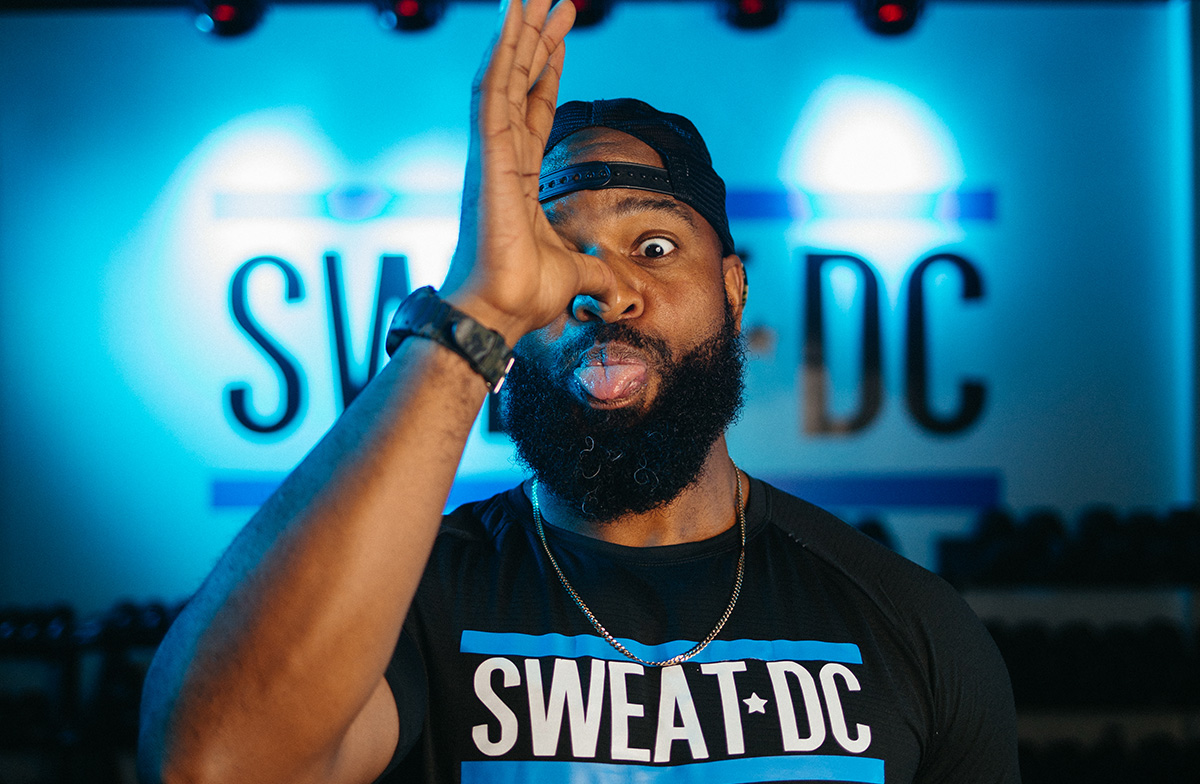
We’re told this is the season of Ho Ho Ho. Joy. Family. Home.
But let’s be honest. The holidays are stressful for almost everyone. Even in the best situations, this time of year comes with pressure. Expectations. Family dynamics. Financial stress. Comparison. The emotional labor of trying to make everything feel warm and magical while quietly holding a lot inside.
For some people, home is comfort. For others, it’s complicated. A place where old roles come back fast. Where you’re expected to be a version of yourself that no longer fits. Where love exists, but understanding feels incomplete.
And for many of us in the LGBTQ community, that stress can carry extra weight. Sitting at tables where parts of who you are feel debated instead of celebrated. Navigating politics and beliefs that don’t feel abstract, but personal. Deciding when to speak up, when to stay quiet, and when to just go refill your drink. Grief changes how the holidays land.
For me, the holidays have often been quiet. I’m deeply grateful for the family I still have and the support they’ve given me, and I also need to be real. I’ve been jealous. Jealous AF. Jealous that I can’t go home and hug my mother. Jealous that my dad isn’t there. Jealous when I see the cozy movie version of the holidays play out in other people’s lives. Not because they don’t deserve it, but because I wish I had it too.
Long before fitness became my career, the gym was my sanctuary. Without movement, these seasons would have been much harder. My body changed as a byproduct, sure, but what movement gave me first was something more important. Stability. A place to put grief. A way to move stress out of my body when words weren’t enough. Stress doesn’t just live in the mind.
We like to think stress is something we can talk through or think our way out of. But stress and anxiety live in the body. Chronic stress has been shown to disrupt sleep, weaken the immune system, and show up physically as tension, fatigue, and pain. When it’s left unaddressed, it doesn’t just affect how we feel emotionally. It affects how we function.
Most people don’t come into fitness because they’re thriving. After 20 years of coaching, almost everyone I’ve met started with physical goals. Lose weight. Build muscle. Look different. What they don’t always see is how stress, burnout, emotional eating, and putting everyone else first got them there. Most people aren’t failing. They’re exhausted.
When we talk about mental health, we think about therapy, medication, boundaries, vacations, or staying away from that one family member who always finds a way to press your buttons. All of those things matter. They save lives. But movement is rarely treated as part of the mental health plan, even though every single person who moves consistently feels better mentally. Not perfect. Just better. As my business partner Chase likes to say, sexy is the side effect. This isn’t just empathy. It’s a strategy.
The holidays don’t sneak up on us. We know which dinners will be hard. We know which brunches will test our patience. We know which days we’ll feel alone. So instead of raw-dogging our way through it, we can prep for it.
First, plan your movement the same way you plan the hard stuff. If you know a dinner is going to be stressful, don’t show up already hot. Schedule your workout that day, the day before, or in the days leading up so your nervous system is already in a better place. You’re not trying to win the day. You’re trying to lower the starting line.
Second, give yourself time limits. You don’t have to do the full four hours. There’s a lot of space between not showing up at all and staying until you’re emotionally fried. Do an hour. Schedule a fake work meeting if you have to. Show up in a way that lets you stay in character and protect your peace. That still counts.
Third, move how you can move. If you’re traveling, alone, out of routine, or your gym is closed, it doesn’t have to be perfect. Twenty minutes works. A walk works. A jog works. A short breathing or meditation session works. Even a quick bodyweight circuit in your childhood bedroom works. And if you need ideas, we share our monthly programming and workouts on the SWEAT DC Instagram so anyone can follow along and move, wherever they are.
Fitness doesn’t have to look good to be effective. It just has to be intentional. Especially this time of year.
As the year comes to a close, my hope isn’t that this season suddenly feels easy. It’s that you feel supported. That you remember movement isn’t about punishment or perfection. It’s about care.
Sometimes the goal isn’t happiness. Sometimes the goal is steadiness. And honestly, some years, that’s a win. We can do that. And we don’t have to do it alone.
Gerard Burley, also known as Coach G, is founder and CEO of Sweat DC.
Commentary
Protecting the trans community is not optional for elected allies and candidates
One of oldest political tactics is blaming vulnerable group for societal woes

Being an ally to the trans community is not a conditional position for me, nor should it be for any candidate. My allyship doesn’t hinge on polling, focus groups, or whether courage feels politically convenient. At a time when trans people, especially trans youth of color, are under coordinated attack, elected officials and candidates must do more than offer quiet support. We must take a public and solid stand.
History shows us how these moments begin. One of the oldest political tactics is to single out the most vulnerable and blame them for society’s anxieties — not because they are responsible, but because they are easier to blame than those with power and protection. In Nazi Germany, Jewish people were primarily targeted, but they were not the only demographic who suffered elimination. LGBTQ people, disabled people, Romani communities, political dissidents, and others were also rounded up, imprisoned, and killed. Among the earliest acts of fascistic repression was the destruction of Berlin’s Institute for Sexual Science, a pioneering center for gender-affirming care and LGBTQ research. These books and medical records were among the first to be confiscated and burned. It is not a coincidence that these same communities are now the first to suffer under this regime, they are our canaries in the coal mine signaling what’s to come.
Congress, emboldened by the rhetoric of the Donald Trump campaign, recently passed HR 3492 to criminalize healthcare workers who provide gender-affirming healthcare with fines and imprisonment. This bill, sponsored by celebrity politicians like Marjorie Taylor Greene, puts politics and headlines over people and health outcomes. Healthcare that a number of cis-gendered people also benefit from byway of hair regeneration and surgery, male and female breast augmentation, hormone replacement therapy etc. Even when these bills targeting this care do not pass, they do real damage. They create fear among patients, legal uncertainty for providers, and instability for clinics that serve the most marginalized people in our communities.
Here in D.C., organizations like Planned Parenthood and Whitman-Walker Health are lifelines for many communities. They provide gender-affirming care alongside primary care, mental health services, HIV treatment, and preventative medicine. When healthcare is politicized or criminalized, people don’t wait for court rulings — they delay care, ration medication, or disappear from the system entirely.
As a pharmacist, I know exactly what that means. These are life-saving medications. Continuity of care matters. Criminalizing and politicizing healthcare does not protect children or families — it puts lives at risk.
Instead of centering these realities, political discourse has been deliberately diverted toward a manufactured panic about trans women in sports. Let me be clear: trans women deserve to be protected and allowed to compete just like anyone else. Athletics have always included people with different bodies, strengths, and abilities. Girls and women will always encounter competitors who are stronger or faster — that is not a gender or sports crisis, it is the nature of competition.
Sports are meant to teach fairness, mutual respect, and the shared spirit of competition — not suspicion or exclusion. We should not police young people’s bodies, and we should reject attempts to single out trans youth as a political distraction. Families and doctors should be the authority on sex and gender identity.
This narrative has been cynically amplified by the right, but too often Democrats have allowed it to take hold rather than forcefully rejecting it. It is imperative to pay attention to what is happening — and to push back against every attempt to dehumanize anyone for political gain.
Trans people have always been part of our communities and our democracy. Protecting the most vulnerable is not radical — it is the foundation of a just society. My work is grounded in that commitment, and I will not waver from it. I’m proud to have hired trans political team Down Ballot to lead my campaign for DC Council At Large. We need more ally leaders of all stages to stand up for the LGBTQ+ community. We must let elected detractors know that when they come for them, then they come for all of us. We cannot allow Fox News and social media trolls to create a narrative that scares us away from protecting marginalized populations. We must stand up and do what’s right.
Anything less is not leadership.
Rep. Oye Owolewa is running for an at-large seat on the D.C. Council.









